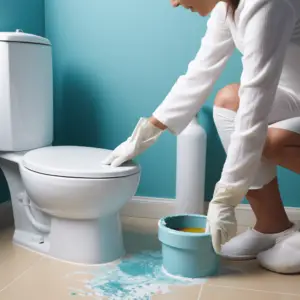You open the bathroom door and instantly notice a weird smell. It’s on the odd side, musty, foul, offensive. The first thing you do is check if the garbage needs to be taken out or if one of your kids has left wet clothes on the floor.
Once you resolve that there really isn’t any reason for the smell, you start wondering why does bathroom smell like paint thinner? Does the scent mean something is wrong?
Table of Contents
Why Does My Bathroom Smell Like Paint Thinner? Common Reasons

If your house smells like paint thinner, it’s very possible that you’ve been painting recently. The smell of paint thinner often lingers around days and even weeks after you’ve painted.
Even simple remodeling jobs can cause your house to smell like paint thinner, just because of the many chemicals used. For instance, resins and other products found in things like new floors have a similar smell to paint thinner.
Furthermore, most paints contain paint thinner by default. As a result, you might paint without using paint thinner, but your house ends up with the scent. Paint thinner is used in numerous other products like clean supplies, and paint strippers also often smell like paint thinner.
Paints also contain Volatile Organic Compounds (VOCs) that add to the odor. The VOCs are overpowering and quickly evaporating. Furthermore, exposure to them can be irritating to the nose or skin.
While these are the most common reasons why you might smell paint thinner in your bathroom, there might be a few other explanations. What if you haven’t painted or remodeled recently and still smell paint thinner in your bathroom? It is a red flag.
Why your house might smell like paint thinner if you haven’t painted recently
Another common culprit in these situations is HVAC systems. Air conditioning systems use a variety of chemicals, and leakages are pretty common. Further, many other malfunctions in the AC can cause a smell akin to paint thinner.
If you suspect that your AC could be behind the smell, check if it gets stronger as you approach the unit. This would basically be a dead giveaway. Furthermore, if you’re already experiencing other issues with your air conditioning system, then it’s likely to be behind the smell.
To avoid this, it’s essential to have your air conditioning system cleaned at least once a year. It should also be serviced twice a year, especially if it’s old.
What to do about it
If you establish that the smell is coming from the AC, contact a professional immediately. Ignoring the problem can lead it to get worse and negatively impacting the lifespan of your HVAC system.
How to eliminate the smells in your house
No matter how beautiful your house looks, you will not be comfortable living in it if it smells bad. As a result, the first natural reaction you get when your bathroom smells like paint thinner is to try and get rid of it. Here are a few things you can do to eliminate the odor and leave your bathroom smelling fresh.
Get the AC repaired
Of course, if the Air conditioning system is behind the smell, the only way to get rid of it will be to get the AC fixed. Even if you are unsure where the odor is coming from but experience other problems with your air conditioning system, it’s essential to get it repaired and cross it off the list.
Increase ventilation
If you haven’t painted or remodeled recently and the AC is working fine, it’s time to try as many things as possible to get rid of the smell.
The first step is to make sure that the room is well ventilated. In case the smell is coming from a cleaning agent or other product you use in your bathroom, it’s advised to leave the windows open for a while after cleaning.
This is not just important to get rid of the odor. Staying in a poorly ventilated area with fumes from chemicals is a safety hazard. It is therefore essential to keep the room as ventilated as possible to get rid of the fumes.
Open all doors, windows, and fans. You can also use portable fans in rooms with no fans or windows.
Clean the room
Even with proper ventilation, if you leave the chemicals or paint supplies behind the smell in the room, the odor will not go away. Part of any successful paint job is cleaning up the resulting mess. However, it is important to clean safely for both yourself and the environment.
Clean paint brushes, rollers, sponges, and anything else that might have come into contact with paint thinner. You can also search around for any paint cans you might have forgotten about.
Place all the empty containers and rags into a sealed bag before putting them in the trash. Once you’re satisfied that the room is clean and everything is in a sealed bag, you can take it to the garbage outside.
Neutralize the odor
If the paint thinner smell proves persistent after the steps above, it’s time to take drastic measures. You need not just mask the odor with an air freshener but neutralize it. There are several things you can do with household items to achieve this.
Neutralizing paint thinner smells

Sprinkle baking soda around the space, let it stay overnight, and vacuum the following day.
If you painted recently, place activated charcoal powder bowls near the painted surfaces and leave them overnight.
l Leave bowlfuls of white vinegar around the room overnight.
l If none of these is available, you can use bowls of plain water and just leave them in the room overnight.
Add pleasant smells
This is after proper ventilation and neutralizing the odor. You can now use an air freshener to ensure that no traces of the odor are left in the room. In the absence of fresheners or scented candles, you can cook a meal with chopped garlic or onions or bake cookies to fill the house with a pleasant aroma.
Final thoughts
While painting might appear to be one of the safest DIY projects you can undertake in your home, it’s important to note that paint thinner can have some serious short-term and even long-term effects when not handled carefully. As a result, do not ignore any paint thinner-like smells in your home.
